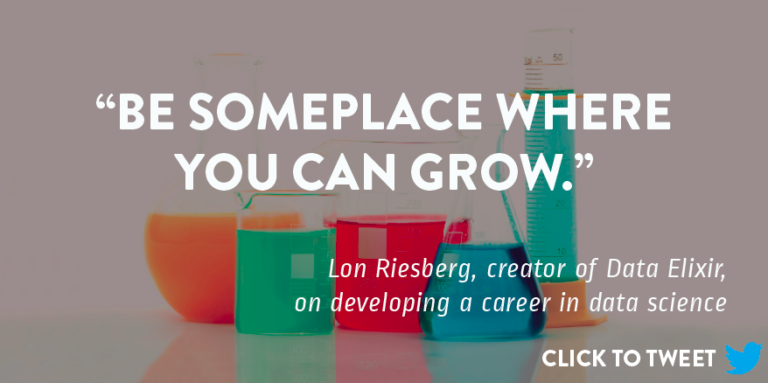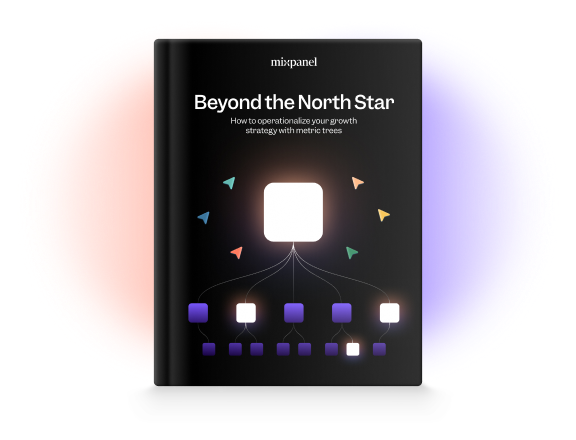Developing a career in data science
Lon Riesberg is the creator and curator of Data Elixir, the popular data science newsletter that delivers the best resources from around the web. If you’re a data lover, be sure to subscribe today.
How did you start your career? And when did you really dive into your data expertise?
I’ve had a couple careers and the first one wasn’t about data at all.
I started out in Computer Science and really liked it but didn’t see myself working at a desk. So after my first graduation, I took off traveling for awhile and ended up teaching at a wilderness skills school called the National Outdoor Leadership School. That turned into a 12 year career leading kayaking and backcountry trips in Alaska, Mexico, and Patagonia. That was awesome.
And exhausting too.
Eventually I found myself in school again, coming back up to speed in computer science. At that point, it was a complete pivot for me but it ended up being a great transition into a new way of exploring the world. It wasn’t long before I had a job at a lab that built and ran projects for NASA – and that’s where it started.
Data. Data, data everywhere!
I really fell in love with it when I discovered data visualization. That was the rabbit hole that sucked me in and then onward to analytics and tools.

What are the biggest trends you’re beginning to notice in the data, machine learning, and analytics fields?
Interest in data is growing fast and not just among people you’d expect to be interested in data. It’s mainstream. People are constantly hearing things in the news about the potential for data to wreak havoc on the world, or save the world, or spy on people, win elections, invest money, find a date, etc, etc. People don’t necessarily understand how data is able to do all that but it seems to be generally understood these days that data is a powerful resource. That level of appreciation is pretty new and it’s a great catalyst for the field.
When it comes to the industry, what’s one widely accepted idea or practice that you disagree with? Why?
That AI is taking over the world.
Well, it’s probably not that extreme but there sure is a lot of hype around AI these days.
And some of it is justified. AI is enabling some amazing things. Like, self-driving cars. Real-time language translation. Medical diagnoses. Beating the world’s best GO player. Some of these things were science fiction just a few years ago.
But we’re far from being replaced. I think it’s more accurate to think of AI as a set of enabling technologies that give us superpowers. Ultimately, that will amplify the good parts of humanity. And, will likely be used to amplify the bad too.
For those developing their careers in data science and other emerging fields, what’s one piece of advice you would share with the data-driven?
Be someplace where you can grow.
One of the things that makes data science so interesting is how fast it’s moving. But you’ve got to keep growing and learning to keep up. If you’re not, you’re falling behind.
It sounds obvious, right? And most organizations will say they support and encourage their people to grow but it’s amazing what actually happens at some places. Don’t just listen to the pitch from HR or even the hiring manager. When you’re interviewing, be sure to talk to people who’ve been there awhile. Sometimes it’s easiest to let people’s careers stagnate and some managers might even see that as a way to save money. I actually heard a manager say once that not everyone needs to grow. For all kinds of reasons, it’s best to steer clear of managers who think like that.
So when you’re interviewing, poke around. Find out how the place really works. Who makes decisions? What has their career looked like? What’s the tech stack? What conferences are people presenting at? What’s on the roadmap? How long do people stay on projects? What kinds of jobs do people have after they leave?
Ultimately, if you can work with data, you have a lot of options and it’s worth taking the time to explore a bit.
You’ve created one of the most popular data science and analytics communities on the web. Tell us more about Data Elixir. Why did you start it? What have been the greatest lessons you’ve learned since building this community?
Honestly, people’s enthusiasm for Data Elixir really took me by surprise.
When I started it, there were some good data newsletters out there but I still found myself poking around the web a bunch to find articles and resources. The newsletters I subscribed to just weren’t picking them up.
So I started Data Elixir as a way to keep track of things I was finding and I had a feeling that other people would find it useful too. That turned out to be true in spades. For the first few months, Data Elixir was growing by more than 200 subscribers a day.
One of the most surprising things for me has been the amount of learning that’s going on. In the beginning, I just assumed that everyone must be experts since a lot of the articles are fairly technical. But after a couple surveys and from watching what articles get clicked on the most, it became clear that yes, there are a lot of experts reading Data Elixir. But none of them are experts in everything and Data Elixir covers a lot of ground. People are reading it to learn. I love that.
Interested in hearing more from Lon? Be sure to subscribe to his newsletter, Data Elixir today.


